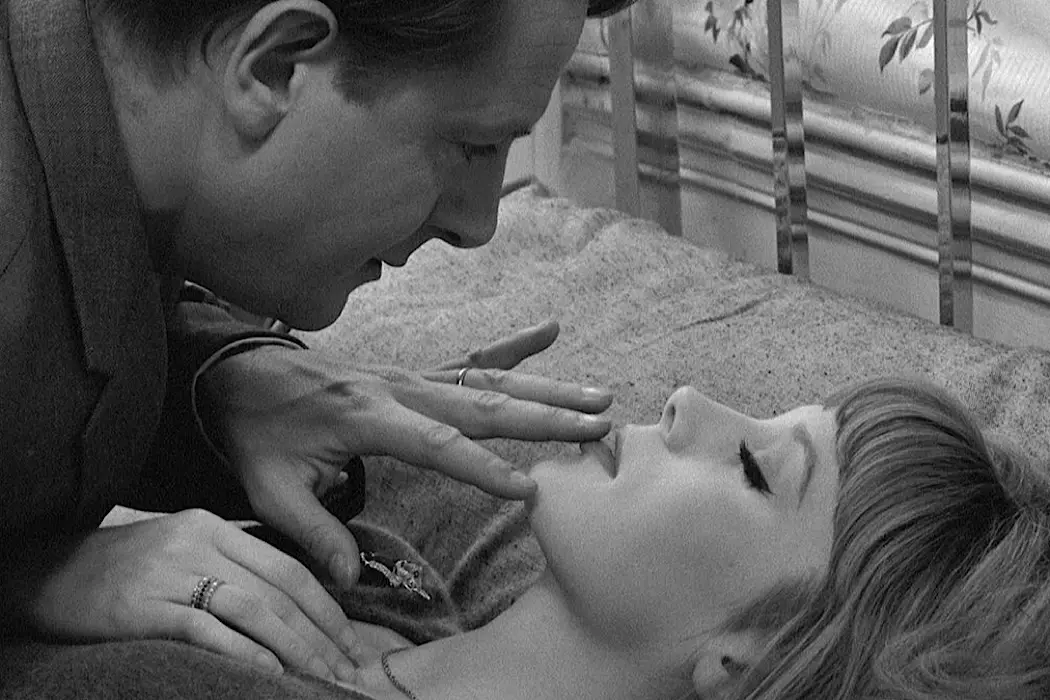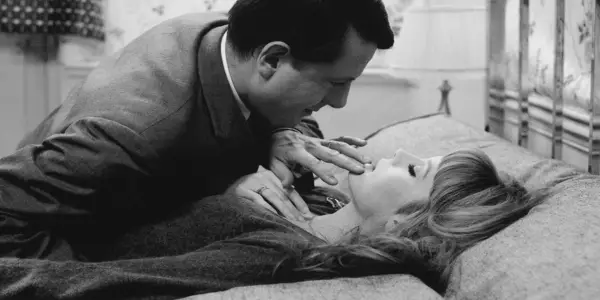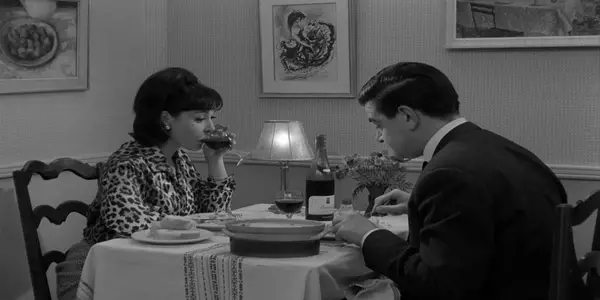THE SOFT SKIN: François Truffaut’s Masterful Affair

Film student and enthusiast from Wisconsin. Lover of films of…
If there was ever a word to describe François Truffaut‘s fourth feature, The Soft Skin, it would be with one he himself used: “downhill”. It’s the type of film where, as it goes along, everything seems to just get worse and worse for its lead; think Paul Hackett’s frantically hopeless journey home in After Hours or the trajectory of any Safdie Brothers picture. On all accounts, after the film was released, Truffaut saw this label as a sort of mark of a failure, a gimmick that makes the film, as he put it, “disagreeable to watch”.

In some ways, he’s right. A film about a middle-aged publisher’s adulterous affair with a younger woman not only sounds uncomfortable but also very trite and old-fashioned, one with too little emotional connection and too much cliché. And with a lesser filmmaker, it may be, it probably would be, but Truffaut being the film god he is, it is quite the opposite. Combining the New Wave sensibilities of his earlier films with the Hitchc*ckian thrills of his later work, The Soft Skin proves, even almost sixty years later, to be one of Truffaut‘s crowning achievements as an auteur.
An Old Fashioned Affair
Following an intimate title sequence of lovers’ hands caressing, the film follows Pierre Lanchenay (portrayed by Jean Desailly), a middle-aged, always traveling, wandering-eyed family man who meets the young, beautiful airline stewardess Nicole (Françoise Dorléac). It’s immediately clear through nothing but Pierre’s longing eyes that he has fallen into the deep end for her and after some awkward first contact, they begin an affair. As the two’s hush-hush romance blossoms, things begin to heat up with Pierre’s marriage.

At first glance, this doesn’t sound like a supremely interesting plot to get thrust into for two hours as, when you boil it down, it’s just another affair story with a lovelorn man and his younger female lover who have to overcome the challenges and heartaches that come with such infidelity. At first glance, it sounds like a plodding snoozefest. Yet, of course, ever the genius he is, Truffaut knew this while writing the film (with co-writer Jean-Louis Richard) and took it as an opportunity to expand on this done to death formulaic plot. With this film, Truffaut wanted to show every in and out of adultery, t0 make a sort of exposé of a film on the subject of adultery. Whereas most films of this sort like to make a sort of romanticized, fast-moving, cornball schlockfest, Truffaut goes for a much quieter, more stripped-back approach with this one which slowly builds and builds as it goes along until it grows so unstable that it ingeniously morphs into a Hitchc*ckian thriller right before your eyes, if a more subdued one.
Without giving anything away, the film starts as simple as it sounds, with the longing of an unhappy man taking solace in his mysterious yet alluring lover and it gives the impression that it’ll stay that way through its runtime. Yet, subtly throughout, the underlying paranoia of Pierre’s anxieties, both sexual and martial, begin to seep through ever so subtly which adds a whole other layer of substance and surprise to the piece. Around the time of writing this film, Truffaut‘s lifelong obsession with Alfred Hitchc*ck was beginning to take shape and you can see that flame of passion starting to burn through the pages of this screenplay, especially in its dubious third act.
The Stewardess, The Writer, and His Wife
Beyond its acutely composed screenplay, it’s The Soft Skin‘s sensually charged and emotionally compelling performances that really bring the house down. The late Françoise Dorléac (sister of French screen legend Catherine Deneuve) gives a passionately understated performance as Nicole. Her wide eyes and gentle smile give little insight into what she’s really thinking as she navigates the uneasy waters of loving a married man and she’s easily the most sympathetic character in the film as Pierre’s anxious obliviousness often leaves her alone, wandering the streets of the city they’re escaping to or from. She’s a lonely victim of a man who has too much business on his mind and too little love in his heart, a man more interested in the receiving end of passion than the true giving of it.
And such a man is brilliantly portrayed by Jean Desailly whose wandering eyes and constantly distressed heart make for a very captivating, if not entirely likable lead. Something about Pierre just seems slimy as even when the affair aspect is stripped away: the way his impatience persuades him to escape conversations, the way his eyes are perpetually stuck on any woman who enters the same room he’s in, and the way he seemingly has no grasp whatsoever on what he desires most in life. With a character like the post-adolescent Ben Braddock in The Graduate, uncertainty is rightfully so seen not as a character flaw but more of an inner conflict, a sort of inner fear that helps you to connect to an imperfect character. Yet here, due to Desailly‘s purposefully impatiently ignorant performance, the endearingness of uncertainty is locked deep away in this stocky husk of a man somewhere between the genuine love for his family and his primal lust for any female who crosses his path.

To round out this sort of upside-down-and-backward love triangle is Nelly Benedetti as Franca, Pierre’s perpetually stuck and emotionally distraught wife. Benedetti gives perhaps the most understated and genuine performance here as she is altogether loving, baffled, angry, and completely unpredictable. Her unpredictability is the primary fuel for the fire that is the final act and she stands out as a true force of nature, one that simultaneously wants to hold her husband close and leave him forever. That richly developed inner conflict of hers it’s accompanying one of the reasons this film stands out as so palpable.
Shadows in Darkness and Light
Like his previous three features, Truffaut puts all of his usual New Wave-isms in the spotlight here as the camera bounces, dashes, and glides through the streets and hallways of Lisbon, Paris, and Reims with that sort 0f cinematic giddiness that is bound to put a smile on any admirer of European cinema. Though this time, there’s a twist. Further expanding on his Hitchc*ck obsession and his affinity for American film noir (previously seen in his sophomore feature, Shoot The Piano Player), Truffaut plays with a lot of shadows here as Pierre creeps through doorways, up elevators, and down endless hallways as the music often morphs from whimsical to ominous and back again. One of the most memorable shots in the film comes early on when Pierre is walking down a hotel hallway while glancing down at pairs of shoes lined across each closed door. The shot is a glorious example of Truffaut‘s combination of the camera gliding almost romantically down the hallway like in his romantic films yet with the ominous shadows of his Hitchc*ckian thrillers. It’s a risky visual juxtaposition but it works wonderfully and perfectly sums up what the film is.
Without giving too much away, the film tackles many themes commonly attributed to stories of infidelity and sexual longing (and the sexual politics of 1960’s France, commonly explored in many New Wave films). The strongest point Truffaut seems to make in this film is giving the audience a true view of sexual anxiety, a subject very rarely tackled before cinema’s radicalization in the 1960s. The whole film lies somewhere between the sunniness of sensuality (even with its inherent darkness, this may just be Truffaut‘s most sensual film) and the shadow of unease. Throughout the film, one wonders if Pierre is truly in love with Nicole or if it’s more of a sexual infatuation, a ticking timebomb of misplaced passion that’ll inevitably burn out just like his marriage is beginning to. It’s an interesting exploration Truffaut conjures up here, if not the deepest in the world, and leaves the viewer with a sense of uneasy pondering as the elusive Fin fades onto the screen.
While not nearly as well known or regarded as François Truffaut‘s Antoine Doniel saga of feature films (The 400 Blows, Stolen Kisses, Bed and Board, and Love on the Run), Jules and Jim, or Day For Night, The Soft Skin stands tall in Truffaut‘s expansive filmography as the true bridge between his romantic, cinematically rich film work and his darker, shadowy, more thriller-esque work primarily found late in his career. It’s not the most groundbreaking or inspiring film in his catalog but it’s still a masterful piece of early Truffaut filmmaking and storytelling that so desperately deserves to be revered as the classic it so clearly is.
What is your favorite Truffaut film? Please share your thoughts in the comment section!
The Soft Skin was released in theaters in 1964.
Watch The Soft Skin
Does content like this matter to you?
Become a Member and support film journalism. Unlock access to all of Film Inquiry`s great articles. Join a community of like-minded readers who are passionate about cinema - get access to our private members Network, give back to independent filmmakers, and more.
Film student and enthusiast from Wisconsin. Lover of films of every kind but particularly an obsessor of the European New Wave.













